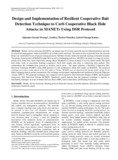Design and Implementation of Resilient Cooperative Bait Detection Technique to Curb Cooperative Black Hole Attacks in MANETs Using DSR Protocol

View/
Date
2020-05Author
Mwangi, Ephantus G.
Muketha, Geoffrey M.
Kamau, Gabriel N.
Metadata
Show full item recordAbstract
Mobile Ad-hoc networks (MANETs) are unique type of wireless networks that are infrastructureless and with no centralised management. Nodes in MANETs act as both routers and hosts. The nodes are free to join and leave the network. Routes are established by use of special routing protocols. Mobility of nodes makes the network topology constantly dynamic. The unique characteristics of MANETs make their security a challenging endeavor. MANETs are prone to a range of security attacks such worm hole, Sybil, black hole, among others. Blackhole is a form of denial of service (DoS) attack. The black hole nodes work in association forming cooperative black hole attacks that drop or redirecting data packets. This compromises the communication process in mission critical areas. The paper proposes a Resilient Cooperative Bait Detection Technique (RCBDT) using DSR protocol to curb collaborative black hole attacks in MANETs. The proposed technique uses source node address as the bait address. Further, RCBDT uses an algorithm that checks nodes energy levels before engaging them in packet transmission. The technique was designed, implemented and simulated in Network Simulator Version 3(NS-3). The proposed technique was compared with Cooperative Bait Detection Scheme (CBDS) and Extended Cooperative Bait Detection Scheme (ECBDS). Simulation results indicate that the proposed technique is superior to benchmark techniques in terms of Packet Delivery Ratio (PDR), End-to-End Delay and Routing Overheads.
Collections
- Journal Articles (CI) [118]
